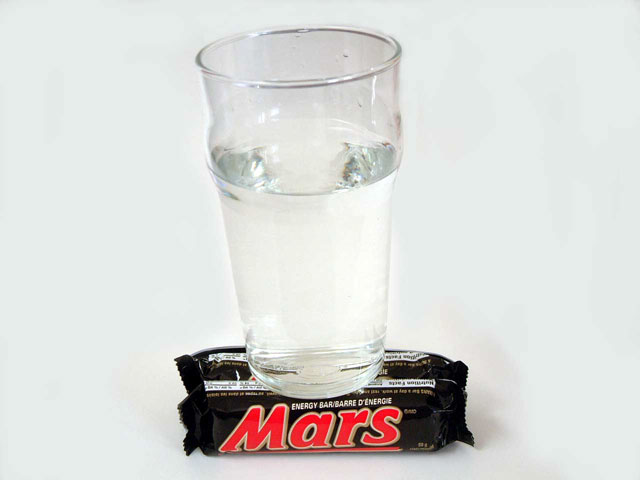| Topic: Mars atmosphere | |
|---|---|
|
I have heard that Mars has polar ice caps which would make me think that it must be water of some sort. One thought I have had is wondering if someone took a plant like say a pine tree and planted it at the edge of the polar ice caps of Mars then would that generate air and there by produce more of an atmosphere that could be friendlier to human life?
The reason I chose a pine tree is it grows in cold areas and I expect it would be the most likely plant to survive the cold temperatures of Mars. I expect maybe certain types of cactus would do too. But I just figured I would put this out and see what other thought. |
|
|
|
|
|
The Mars polar caps are dry ice, not water ice.
The problem with Mars is that it cannot hold onto an atmosphere. It produces one all the time, chemical reactions on the surface constantly produce gases that would normally be retained in an atmosphere. But the core of the planet is dead. It has only minor, sporadic magnetic fields, it doesn't have a magnetosphere like Earth. A magnetosphere is created by a dynamic core and surrounds the planet, forming a barrier against deadly solar and cosmic radiations. In particular it bends the solar wind around the planet. The solar wind is so charged with subatomic excitation that it literally blows other molecules and particles like a wind, hence the term, 'solar wind.' What it does at Mars is it literally blows the gases off the planet's surface and off into space, this has been detected and photographed by the Mars orbiters. The surface of Mars constantly produces atmospheric gases just like Earth, but they're being constantly blown off the planet by the solar wind, because the core is dead and there is no powerful magnetosphere to bend the solar wind away from the atmosphere. |
|
|
|
|
|
Maybe what they need to try then is to build a giant electronic magnet deep inside Mars. I would hate to think what they would have to use to power that thing though. Especially if they decided to try to cover the surface of Mars with solar panels. hahaha
|
|
|
|
|
|
By the way. I just wanted to say thank you for you reply.
One last joke though. Since it's dry ice on Mars. That means if someone gets stranded there and they have a bunch of sodas that have gone flat. They can re-carbonate them. hahaha |
|
|
|
|
|
Edited by
Conrad_73
on
Tue 01/07/14 11:16 AM
|
|
|
The Mars polar caps are dry ice, not water ice. The problem with Mars is that it cannot hold onto an atmosphere. It produces one all the time, chemical reactions on the surface constantly produce gases that would normally be retained in an atmosphere. But the core of the planet is dead. It has only minor, sporadic magnetic fields, it doesn't have a magnetosphere like Earth. A magnetosphere is created by a dynamic core and surrounds the planet, forming a barrier against deadly solar and cosmic radiations. In particular it bends the solar wind around the planet. The solar wind is so charged with subatomic excitation that it literally blows other molecules and particles like a wind, hence the term, 'solar wind.' What it does at Mars is it literally blows the gases off the planet's surface and off into space, this has been detected and photographed by the Mars orbiters. The surface of Mars constantly produces atmospheric gases just like Earth, but they're being constantly blown off the planet by the solar wind, because the core is dead and there is no powerful magnetosphere to bend the solar wind away from the atmosphere. Carbondioxide? Yep,the seasonal ones,the permanent ones at the Poles are composes of frozen H2O. http://www.jpl.nasa.gov/events/lectures_archive.php?month=12&year=2010 |
|
|
|
|
|
I have heard that Mars has polar ice caps which would make me think that it must be water of some sort. One thought I have had is wondering if someone took a plant like say a pine tree and planted it at the edge of the polar ice caps of Mars then would that generate air and there by produce more of an atmosphere that could be friendlier to human life? The reason I chose a pine tree is it grows in cold areas and I expect it would be the most likely plant to survive the cold temperatures of Mars. I expect maybe certain types of cactus would do too. But I just figured I would put this out and see what other thought. actually Algae would be a better choice,since they can stand much more rugged conditions than higher plants! |
|
|
|
|
|
|
|
|
Certainly seem to find algae in weird places considering most of the time the thing of algae as a ocean dweller. Covering rocks and trees up in the mountains. Fungus also seems like a pretty hardy life form. I found a mushroom growing on a log under water. Never expected that.
|
|
|
|
|
|
Carbondioxide?
Yep,the seasonal ones,the permanent ones at the Poles are composes of frozen H2O. http://www.jpl.nasa.gov/events/lectures_archive.php?month=12&year=2010 Quite right. The bulk of it however is dry ice. The caps seasonally shrink, when there's not much there it is believed the remnant reveals ice that is water ice. For all intents and purposes however, when you look at Mars and you see ice at the caps, it's dry ice. The Moon has water ice at the poles too. In the rock. It's not that unusual but accessibility is key. So far Mars (manned) mission planning has gone so far as suggestions of mining its moons (captured asteroids) or even hijacking a cometary body en-route. That'd be because water is pretty inaccessible on Mars, the little of it there is, largely buried under dry ice and half it within rock like on other bodies with little/no atmosphere. Exposed water ice tends to boil away then the gases get blown off the surface of the world. Most light gases do. To keep water ice on Mars you kind of need it buried under dry ice. |
|
|
|
|
|
The Mars polar caps are dry ice, not water ice. The problem with Mars is that it cannot hold onto an atmosphere. It produces one all the time, chemical reactions on the surface constantly produce gases that would normally be retained in an atmosphere. But the core of the planet is dead. It has only minor, sporadic magnetic fields, it doesn't have a magnetosphere like Earth. A magnetosphere is created by a dynamic core and surrounds the planet, forming a barrier against deadly solar and cosmic radiations. In particular it bends the solar wind around the planet. The solar wind is so charged with subatomic excitation that it literally blows other molecules and particles like a wind, hence the term, 'solar wind.' What it does at Mars is it literally blows the gases off the planet's surface and off into space, this has been detected and photographed by the Mars orbiters. The surface of Mars constantly produces atmospheric gases just like Earth, but they're being constantly blown off the planet by the solar wind, because the core is dead and there is no powerful magnetosphere to bend the solar wind away from the atmosphere. As Invictus has pointed out, there is plenty of water at the poles. You are correct about the Solar Wind removing the atmosphere but incorrect about the time it takes to remove it. Terraforming Mars has been studied by many and the trick is to heat the planet with Global Warming by releasing the CO2 gas and maybe some others, then seeding the planet with algae to convert the CO2 to oxygen. http://science1.nasa.gov/science-news/science-at-nasa/2001/ast09feb_1/ |
|
|
|
|
|
The Mars polar caps are dry ice, not water ice. The problem with Mars is that it cannot hold onto an atmosphere. It produces one all the time, chemical reactions on the surface constantly produce gases that would normally be retained in an atmosphere. But the core of the planet is dead. It has only minor, sporadic magnetic fields, it doesn't have a magnetosphere like Earth. A magnetosphere is created by a dynamic core and surrounds the planet, forming a barrier against deadly solar and cosmic radiations. In particular it bends the solar wind around the planet. The solar wind is so charged with subatomic excitation that it literally blows other molecules and particles like a wind, hence the term, 'solar wind.' What it does at Mars is it literally blows the gases off the planet's surface and off into space, this has been detected and photographed by the Mars orbiters. The surface of Mars constantly produces atmospheric gases just like Earth, but they're being constantly blown off the planet by the solar wind, because the core is dead and there is no powerful magnetosphere to bend the solar wind away from the atmosphere. As Invictus has pointed out, there is plenty of water at the poles. You are correct about the Solar Wind removing the atmosphere but incorrect about the time it takes to remove it. Terraforming Mars has been studied by many and the trick is to heat the planet with Global Warming by releasing the CO2 gas and maybe some others, then seeding the planet with algae to convert the CO2 to oxygen. http://science1.nasa.gov/science-news/science-at-nasa/2001/ast09feb_1/ I guess that means we need to get over there with a bunch of aerosol cans and cars to start global warming on Mars. |
|
|
|
|
|
Edited by
vanaheim
on
Wed 01/08/14 10:59 PM
|
|
|
As Invictus has pointed out, there is plenty of water at the poles. You are correct about the Solar Wind removing the atmosphere but incorrect about the time it takes to remove it. Terraforming Mars has been studied by many and the trick is to heat the planet with Global Warming by releasing the CO2 gas and maybe some others, then seeding the planet with algae to convert the CO2 to oxygen. http://science1.nasa.gov/science-news/science-at-nasa/2001/ast09feb_1/ More science-journalism. Listen, these are published thought-experiments for postgrad interns at NASA. In this particular case the students are working on the premise "but what if Mars had a magnetosphere". That is not the case. The magnetic fields are minor and sporadic on Mars, the core is dead. There are no tidal forces to have kept it dynamic. Mars has no magnetosphere at all, the fields that would produce one are merely seasonal stormfronts on the planet's surface. And the only way a storm can function on Mars is because it's functioning through a transient, sporadic magnetic field moving around the surface for a bit before disappearing, and taking the storm's huff with it. Mars cannot hold an atmosphere. It cannot hold greenhouse gases. (edited to note, not in the volume required, not in the breadth of molecules required). Perhaps a university (.edu) site might be better than NASA journals. Yes the science is good, but the premise isn't necessarily anything but fancy. |
|
|
|
|
|
I just wanted to say thank you guys for contributing to this discussion. I've enjoyed reading the posts in response to my question and it's fun to see how it progresses. Even though it really hasn't gone to a second page yet. It's still been interesting.
|
|
|
|
|
|
As Invictus has pointed out, there is plenty of water at the poles. You are correct about the Solar Wind removing the atmosphere but incorrect about the time it takes to remove it. Terraforming Mars has been studied by many and the trick is to heat the planet with Global Warming by releasing the CO2 gas and maybe some others, then seeding the planet with algae to convert the CO2 to oxygen. http://science1.nasa.gov/science-news/science-at-nasa/2001/ast09feb_1/ More science-journalism. Listen, these are published thought-experiments for postgrad interns at NASA. In this particular case the students are working on the premise "but what if Mars had a magnetosphere". That is not the case. The magnetic fields are minor and sporadic on Mars, the core is dead. There are no tidal forces to have kept it dynamic. Mars has no magnetosphere at all, the fields that would produce one are merely seasonal stormfronts on the planet's surface. And the only way a storm can function on Mars is because it's functioning through a transient, sporadic magnetic field moving around the surface for a bit before disappearing, and taking the storm's huff with it. Mars cannot hold an atmosphere. It cannot hold greenhouse gases. (edited to note, not in the volume required, not in the breadth of molecules required). Perhaps a university (.edu) site might be better than NASA journals. Yes the science is good, but the premise isn't necessarily anything but fancy. Gee, you really should read more. If you had bothered to read the whole article, you would have seen the discussion of the effect solar wind has on the problem. And apparently you have no clue as to the relationship of published articles by NASA vs Universities. Your comment that "Mars cannot hold an atmosphere" is simply false, which you would know had you read further. If you had the ability to assess the intensity of Solar wind now vs the time Mars lost it's atmosphere you would realize your generalizations don't apply, just as they don't apply to Venus which is global warming out of control with no magnetic field. And BTW, when the post grads at NASA start these types of projects, they start with the best collection of papers and research data on the planet ... and usually the best peer review. Just about every specialist from every university responds to the comment "Someone from NASA is calling". |
|
|
|
|
|
With Venus being as close to the sun as it is might it be reasonable to think that even with a proper magnetosphere that global warming would still be a problem because of how much the water would evaporate and trap heat?
|
|
|
|
|
|
The Mars polar caps are dry ice, not water ice. The problem with Mars is that it cannot hold onto an atmosphere. It produces one all the time, chemical reactions on the surface constantly produce gases that would normally be retained in an atmosphere. But the core of the planet is dead. It has only minor, sporadic magnetic fields, it doesn't have a magnetosphere like Earth. A magnetosphere is created by a dynamic core and surrounds the planet, forming a barrier against deadly solar and cosmic radiations. In particular it bends the solar wind around the planet. The solar wind is so charged with subatomic excitation that it literally blows other molecules and particles like a wind, hence the term, 'solar wind.' What it does at Mars is it literally blows the gases off the planet's surface and off into space, this has been detected and photographed by the Mars orbiters. The surface of Mars constantly produces atmospheric gases just like Earth, but they're being constantly blown off the planet by the solar wind, because the core is dead and there is no powerful magnetosphere to bend the solar wind away from the atmosphere. i don't think mars is big enough to hold an atmosphere like the earths... it's about a third of the earths size, so gravity will only hold about about 10 miles depth of gasses... |
|
|
|
|
|
The Mars polar caps are dry ice, not water ice. The problem with Mars is that it cannot hold onto an atmosphere. It produces one all the time, chemical reactions on the surface constantly produce gases that would normally be retained in an atmosphere. But the core of the planet is dead. It has only minor, sporadic magnetic fields, it doesn't have a magnetosphere like Earth. A magnetosphere is created by a dynamic core and surrounds the planet, forming a barrier against deadly solar and cosmic radiations. In particular it bends the solar wind around the planet. The solar wind is so charged with subatomic excitation that it literally blows other molecules and particles like a wind, hence the term, 'solar wind.' What it does at Mars is it literally blows the gases off the planet's surface and off into space, this has been detected and photographed by the Mars orbiters. The surface of Mars constantly produces atmospheric gases just like Earth, but they're being constantly blown off the planet by the solar wind, because the core is dead and there is no powerful magnetosphere to bend the solar wind away from the atmosphere. i don't think mars is big enough to hold an atmosphere like the earths... it's about a third of the earths size, so gravity will only hold about about 10 miles depth of gasses... It's not. But we don't need that much atmosphere to breath. Thin alpine air would work just fine. |
|
|
|
|
|
Gee, you really should read more. If you had bothered to read the whole article, you would have seen the discussion of the effect solar wind has on the problem. And apparently you have no clue as to the relationship of published articles by NASA vs Universities. Your comment that "Mars cannot hold an atmosphere" is simply false, which you would know had you read further. If you had the ability to assess the intensity of Solar wind now vs the time Mars lost it's atmosphere you would realize your generalizations don't apply, just as they don't apply to Venus which is global warming out of control with no magnetic field. And BTW, when the post grads at NASA start these types of projects, they start with the best collection of papers and research data on the planet ... and usually the best peer review. Just about every specialist from every university responds to the comment "Someone from NASA is calling". So I take it you're a really big NASA fan. We'll just leave it at that. |
|
|
|
|
|
Gee, you really should read more. If you had bothered to read the whole article, you would have seen the discussion of the effect solar wind has on the problem. And apparently you have no clue as to the relationship of published articles by NASA vs Universities. Your comment that "Mars cannot hold an atmosphere" is simply false, which you would know had you read further. If you had the ability to assess the intensity of Solar wind now vs the time Mars lost it's atmosphere you would realize your generalizations don't apply, just as they don't apply to Venus which is global warming out of control with no magnetic field. And BTW, when the post grads at NASA start these types of projects, they start with the best collection of papers and research data on the planet ... and usually the best peer review. Just about every specialist from every university responds to the comment "Someone from NASA is calling". So I take it you're a really big NASA fan. We'll just leave it at that. No. I worked there. And I know how it works. Seven years of physics education and an engineering degree helps too. |
|
|
|
|
|
With Venus being as close to the sun as it is might it be reasonable to think that even with a proper magnetosphere that global warming would still be a problem because of how much the water would evaporate and trap heat? That's correct. The inverse square law puts a lot on energy from the Sun into Venus' atmosphere compared to Mars. Venus also has huge amounts of sulfur in the atmosphere as well. Here is an interesting blurb from Wiki: Unlike Earth, Venus lacks a magnetic field. Its ionosphere separates the atmosphere from outer space and the solar wind. This ionised layer excludes the solar magnetic field, giving Venus a distinct magnetic environment. This is considered Venus's induced magnetosphere. Lighter gases, including water vapour, are continuously blown away by the solar wind through the induced magnetotail.[3] It is speculated that the atmosphere of Venus up to around 4 billion years ago was more like that of the Earth with liquid water on the surface. A runaway greenhouse effect may have been caused by the evaporation of the surface water and subsequent rise of the levels of other greenhouse gases.[7][8] Despite the harsh conditions on the surface, the atmospheric pressure and temperature at about 50 km to 65 km above the surface of the planet is nearly the same as that of the Earth, making its upper atmosphere the most Earth-like area in the Solar System, even more so than the surface of Mars. Due to the similarity in pressure and temperature and the fact that breathable air (21% oxygen, 78% nitrogen) is a lifting gas on Venus in the same way that helium is a lifting gas on Earth, the upper atmosphere has been proposed as a location for both exploration and colonization.[9] On January 29, 2013, ESA scientists reported that the ionosphere of the planet Venus streams outwards in a manner similar to "the ion tail seen streaming from a comet under similar conditions." |
|
|
|
|











